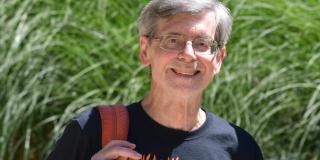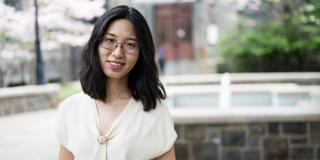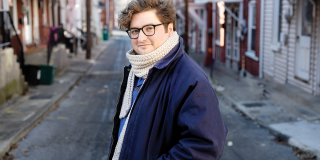Global interests help Theresa Mejia become global citizen
One of the advantages of a liberal arts education is the ability to find innovative paths and change course with new interests. Maria Theresa Mejia thought she would find a perfect fit as an environmental science major when she arrived at Lehigh, given her interests in global warming, climate change and how people are affected by these phenomena. Yet Mejia discovered the global studies program, and her path headed in a life-changing direction.
Soon after beginning her coursework, Mejia began to realize and question her role as a global citizen. Her international education began with her acceptance into the global citizenship program during the fall semester of her first year. In 2011, she traveled with the program to China, eager to see the world with a more holistic view of culture, religion and politics. There, Mejia and her peers were able to use the knowledge they had acquired in the classroom and put it into action as they interacted with immigrant workers, visited water villages and worked with an elderly community service program.
“Traveling to Shanghai and putting into context what we had learned in the classroom was a great growing experience for me,” said Mejia. “This helped me realize how much I have learned and have yet to learn about the world around me.”
The following year, Mejia immersed herself in both Indonesian culture and Kosovar society. With the aid of a Strohl Grant, Mejia traveled to Indonesia as part of the US-Indonesia Partnership Program (USIPP). The USIPP Consortium, founded by 12 universities in the U.S. and Indonesia, is committed to increasing relationships and scholarship between higher education institutions in the two nations. Joining three other American students, Mejia lived and traveled with four Indonesian counterparts, discussing culture, religion, government and other topics. Each of the students was able to truly share cultural, political, religious, and economic ideas and beliefs while living in one another’s homelands, Mejia said.
“The time in Indonesia spent with our counterparts was the ultimate time to ask questions that you might not necessarily bring up in everyday conversation,” she said. “While USIPP was definitely not an easy program, I know that it was a life-changing experience that I will continue to learn from beyond my Lehigh years.”
Immediately upon her return from Indonesia, Mejia flew to Kosovo on an Iacocca International Internship. As an intern, she participated in the American Councils’ mission to provide higher education programs for Kosovar-Albanians. While in Kosovo, Mejia lived with a host family and worked in a four-person fundraising office raising funds, attending meetings and communicating with the American Councils’ U.S. office in Washington, D.C.
“My internship in Kosovo marked the first time I traveled alone and is definitely one that I will never forget,” said Mejia. “Despite traveling by myself in a country that I knew little about, I adapted quickly and integrated with my new, third home country. I was welcomed into my host family and in the workplace with the American Councils team.”
Pursuing a dual degree in global studies and women, gender and sexuality studies, she is now giving back to the Lehigh community. This past spring, through an internship at Lehigh’s Women’s Center, Mejia helped to organize, in conjunction with Turning Point of the Lehigh Valley, the Clothesline Project, which strives to increase awareness of violence against women, one of the many global issues on which Mejia is focusing. Gaining experience in education, Mejia also participates in the Prison Project at the Easton correctional facility where she tutors inmates on GED courses.
Now in her fourth year, Mejia continues her understanding of sociological patterns and gender inequality, both globally and in her own community. She has aspirations to continue her education and pursue a master’s degree in sociology.
“I believe that the most important lesson that continues to resonate throughout my abroad experiences is that exploring cultures and traveling is uncomfortable—traveling means going beyond your familiar and comfortable environment,” reflected Mejia. “However, it is how I choose to act and react to this uncomfortable feeling that matters.”
Kathleen Bittner






